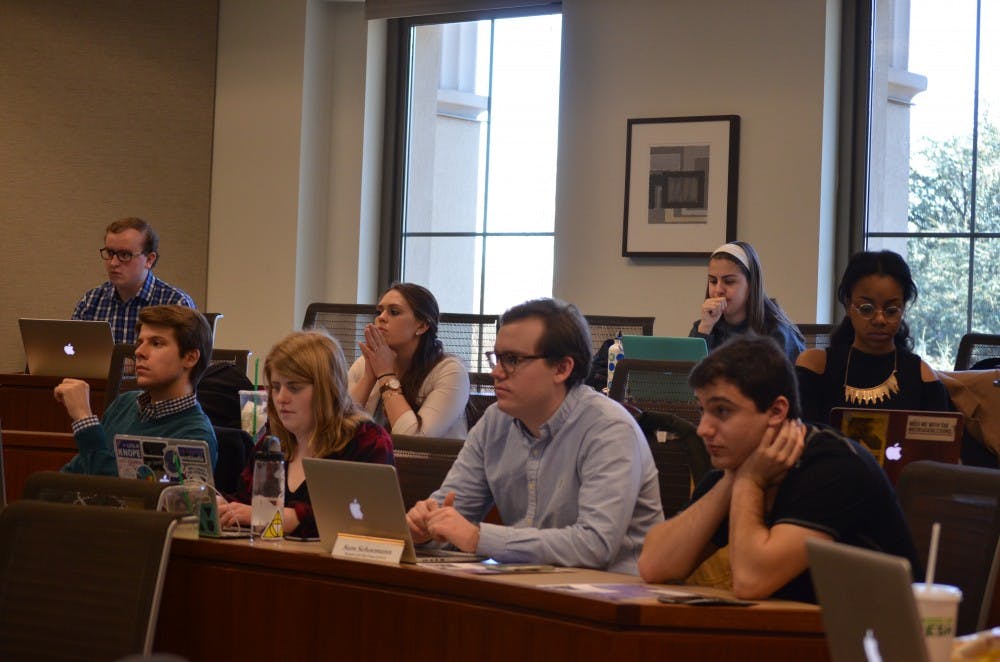The Undergraduate Senate passed a referendum on Feb. 21, which, if students pass in the spring, would eliminate class councils completely from Student Government. The referendum would also remove the ability of a school council president from providing their consent to the appointment of a senator, according to the bill’s author, senior class Senator and Class of 2016 President Kevin Michael Levy.
Regarding the latter part of the referendum on school council presidents, Levy said past school council presidents have never exercised this power in his time as a senator. He also added that currently, this only lengthens the process of electing representatives from the schools themselves.
As described in the SG Constitution and confirmed by Levy, the roles of class councils are to promote class unity and to provide programming for each individual class. However, over the past few years, Levy said council members have been unequipped or lacking in initiative to take on these projects, leading them to become largely ineffective.
“I’ve been in the student government for four years, and I’ve always been a great proponent of the class and school councils because I thought they could do more,” Levy said. “I thought if we just gave them more resources, we gave them more opportunity, that they would be able to perform. We’ve tried that over the past three years, and this year I decided to take a more final approach.”
Josh Ledyard, vice president of the freshman class council, said he thinks the class council positions lack definitive roles which leads to confusion, and he also cited a lack of guidance and clarity as reasons for the lack of programming.
“When we ran, I guess we had a vague understanding of what our office was. You normally think, ‘Oh, class councils you know, we’re going to plan activities for the class and work on class unity and work on stuff like that,’” Ledyard said. “But then we waited, and we waited, and we never heard anything from the executive branch.”
Ledyard said freshman council members expressed interest in planning some end-of-the-year events such as movie nights for freshmen, but received conflicting information regarding funding for programming from different sources. He said executives told him that funding was available, while senate members have said it was tied up in other places such as the office of alumni relations.
Levy said he believes others already employed by the University may be more qualified to implement some of these class-specific programs such as fundraising for class gifts and putting on end-of-the-year receptions. Therefore, electing those without this experience is unproductive, according to Levy.
The referendum will be put to vote during the general SG election. Because there is no guarantee that students will pass the referendum, Levy said the student body will still elect people to fill class council positions for each grade in the spring.
If the referendum does pass, all of those previously elected to class councils in the fall, in addition to all of the class council positions that students were just elected to fill would cease to exist, immediately stripping those students of their titles.
Ledyard said he doesn’t agree with taking away positions that people would have just worked for and earned. He also said that in order for class councils to exist in the future, those interested in the positions must demonstrate their excitement and make their classmates recognize the potential that they have.
“If people show that there’s interest in it, and people show that they want to have these positions and do things with these positions, that will get people excited about the referendum for them to say ‘No, I like that there are people who are excited and want to do things for me and that there’s people who want to make American a better place for me,” Ledyard said.
If approved, the referendum would also reallocate the funds that class councils previously received, moving them to other areas of SG such as the Student Union Board, Kennedy Political Union and Founder’s Day, all of which fall under the Vice President’s cabinet.
Ledyard said he thinks senate members should take further actions to define the class council roles more, as opposed to simply getting rid of them.
“I think it’s always good to have more people representing your class and getting more people involved, rather than constructing and limiting power to only so many people,” Ledyard said. “I think they should work on clarifying what the roles of the positions are and rather than strike the position from the bylaws, define in the bylaws, saying ‘this is what their role is.’”
Although the legislation would change more of the internal structure of the senate as opposed to campus as a whole, Levy said the referendum would make a large difference in catering programming on campus more towards what students actually want.
“Students should vote for this because they should want to see more of their money going to programs that they actually want to see, and programming done well,” Levy said. “This is something that will free up resources to go to the things that students want to see on campus, and our data shows that students support.”





